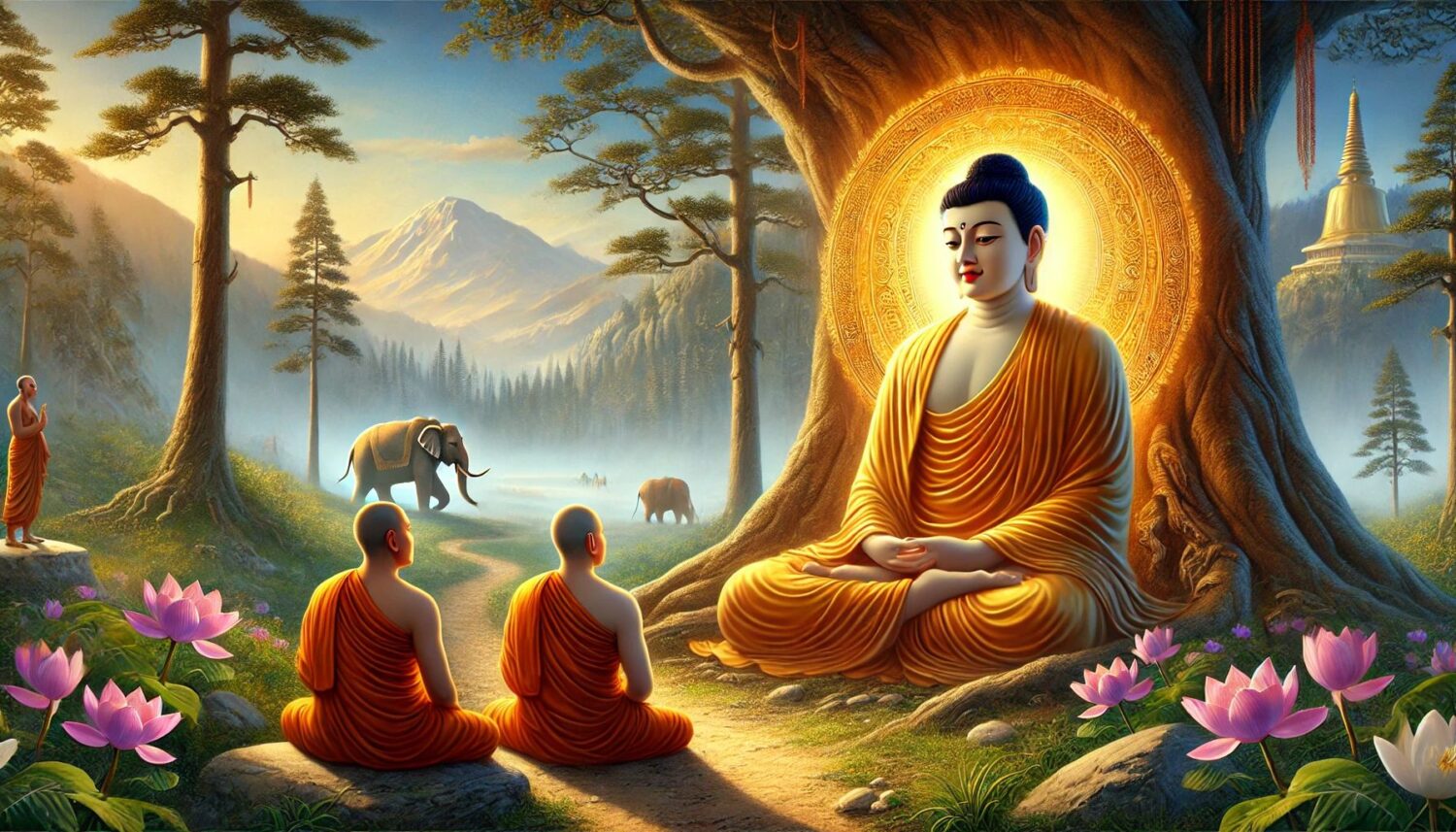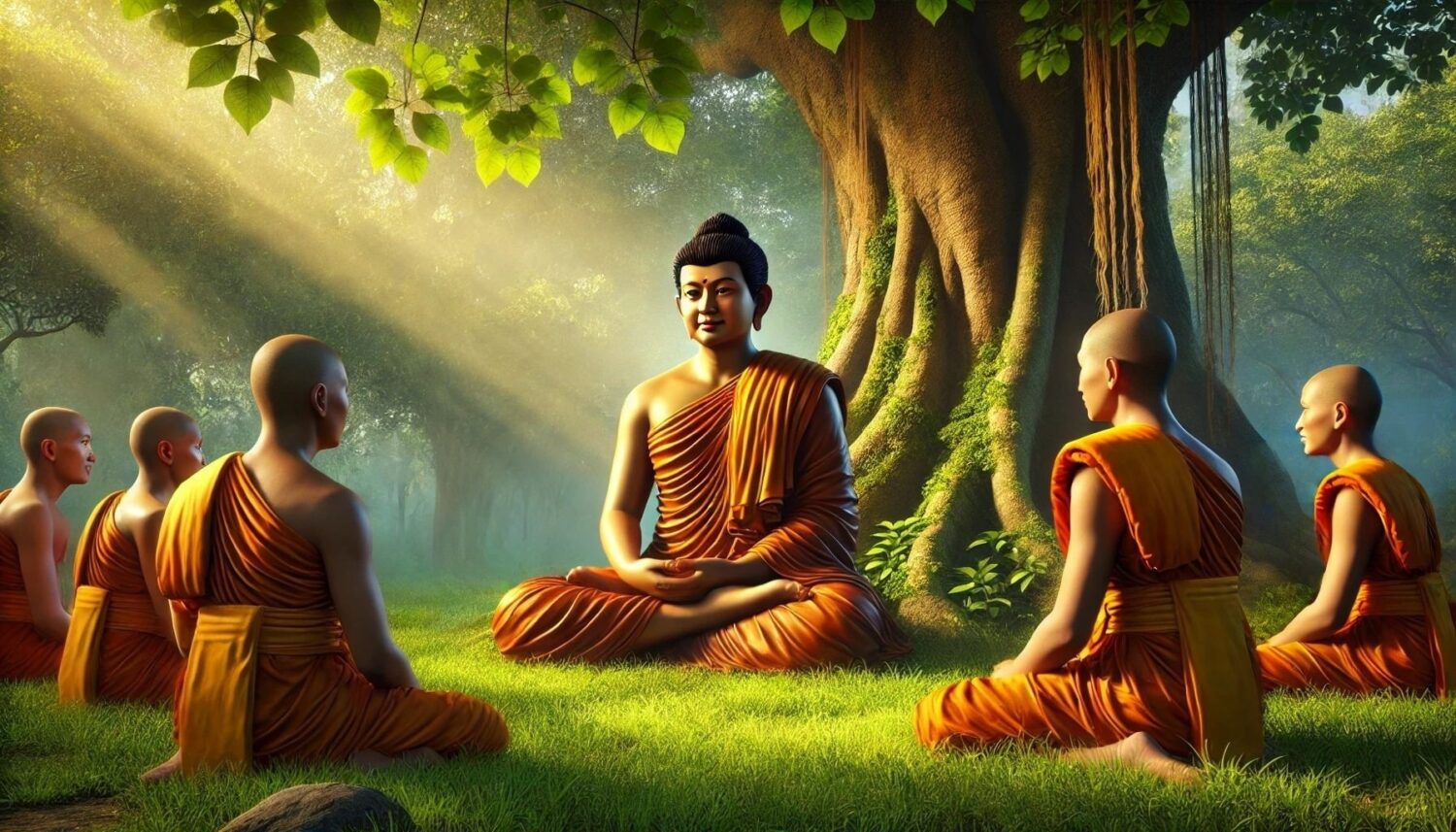
Date: 05/24/2025 05/25/2025
Location: Star Lake Meditation Center
Teacher: Shilin Long
Dharma Talk
The Son of Viśākhā
During the time of the Buddha, there was a woman named Viśākhā, who was not only exceptionally wise and virtuous but also deeply devoted to the Dharma. She frequently invited the Buddha and his disciples to her home to make offerings.
At that time, the King of Kosala, Prasenajit, greatly admired Viśākhā’s wisdom and virtue, addressing her as his sister. Viśākhā had thirty-two sons, all of whom were exceptionally handsome, dignified, and strong. They were outstanding among their peers and married the daughters of noble and influential families in the country. Because of this, they were widely revered by the people.
One day, Viśākhā’s youngest son was riding an elephant out for a pleasure ride. On a bridge over the city’s moat, he happened to encounter the prime minister’s son, who was returning from outside the city. Neither was willing to yield to the other.
At that moment, Viśākhā’s son, filled with anger and arrogance, relied on his strength and grabbed the prime minister’s son, along with his carriage, and threw them into the moat, leaving him with a cracked skull, bleeding profusely, and covered in injuries.
The prime minister, seeing his son being humiliated and harmed, was both furious and frustrated. However, since the offender was a royal relative and physically strong, he dared not express his anger openly. Instead, he secretly devised a scheme to have others carry out the killing for him.
The prime minister knew that Viśākhā’s sons were skilled equestrians. He crafted thirty-two exquisite whips made of the seven precious materials, with sharp steel swords hidden inside their handles.
He personally delivered the whips to Viśākhā’s household, saying to the thirty-two sons, “You are all valiant warriors with strong and imposing figures. Ordinary whips are unworthy of you. I have specially commissioned these superior whips to match your noble status.”
Each of Viśākhā’s sons loved the whips, carrying them wherever they went.
At that time, the law of the kingdom stated that no weapons could be brought into the royal court when meeting the king.
Seeing that his plan had succeeded, the prime minister slandered them before the king, saying, “The thirty-two sons of Viśākhā are plotting a rebellion!”
However, the king did not believe him.
A few days later, the prime minister once again persuaded the king, saying, “These thirty-two men truly intend to rebel. They each carry weapons concealed within their whips. Moreover, they are all exceptionally strong and fierce, each capable of defeating a thousand men. If they revolt, the consequences will be unimaginable!”
This time, the king believed the prime minister’s words.
He summoned the thirty-two sons of Viśākhā and said, “Your whips are finely crafted. May I borrow them for a look?”
Unaware of the plot against them, the thirty-two sons obediently handed over their whips, unknowingly sealing their own fate.
Upon examining the whips, the king indeed found the hidden weapons.
On that very day, he stationed executioners in the palace and summoned the thirty-two sons one by one.
Tragically, the thirty-two sons were executed unjustly, perishing with their grievances unaddressed.
After killing them, the king had their heads severed, wrapped up, and sent to Viśākhā’s home.
That day, Viśākhā was preparing to make offerings to the Buddha and his disciples. She was unaware of her sons’ fate.
After the messenger departed, Viśākhā mistook the package for an offering from the king, preparing to open it.
At that moment, the World-Honored One said, “Viśākhā, do not open it yet. Wait until after the offering.”
After the offerings were completed, the Buddha expounded the Dharma to Viśākhā, saying:
”Our bodies are composed of the four great elements. They are impermanent, filled with suffering, and empty of a true self. Life is like a house on fire, consumed by the afflictions of attachment, delusion, and ignorance. The world’s emotions and attachments are not worth clinging to. The wise should hasten to abandon them.”
Upon hearing the Buddha’s teaching, Viśākhā suddenly attained the fruit of Anāgāmī (Non-returner).
After the Buddha departed, Viśākhā opened the package and saw inside the thirty-two heads of her sons.
However, as she had already transcended worldly attachments, she did not grieve, but calmly sighed, saying:
”Birth inevitably leads to death. It is only because people fail to realize the truth of impermanence that they remain entangled in worldly affections, endlessly trapped in the cycle of rebirth. But is there truly a need for such suffering?”
The families of the thirty-two sons’ wives, upon hearing of this tragedy, became enraged. They gathered their troops to attack the cruel and tyrannical king, seeking revenge for the thirty-two sons.
Fearing for his life, the king fled to the monastery, seeking the Buddha’s protection.
Upon learning of this, Venerable Ānanda knelt with palms joined and asked the Buddha, “World-Honored One, what past causes and conditions led to the king killing Viśākhā’s thirty-two sons?”
The Buddha replied, “This event did not only happen in this life. It has been occurring for countless kalpas. Now, listen carefully, and I will explain the causes and conditions behind it.”
The Buddha then told Venerable Ānanda:
Long ago, thirty-two men, in order to satisfy their hunger, stole a cow and led it to the home of a poor old woman, asking to butcher and cook it there.
The old woman not only did not stop them, but she happily provided them with cooking utensils.
At that moment, the cow knelt down and begged for mercy, but the men, blinded by greed, felt no compassion.
Before dying, the cow vowed:
”Since you kill me today, I will seek revenge against you for lifetimes to come!”
After slaughtering the cow, the thirty-two men and the old woman feasted upon it with delight.
The cow at that time was King Prasenajit in this life.
The thirty-two men who stole the cow were Viśākhā’s thirty-two sons.
The old woman who helped them was Viśākhā herself.
Because of this karma, for five hundred lifetimes, the thirty-two men were repeatedly killed by King Prasenajit.
And due to her joyful participation in slaughter, Viśākhā was reborn five hundred times as their mother, experiencing the deep sorrow of losing her sons again and again.
However, in this life, Viśākhā was fortunate to encounter the Buddha.
Due to her continuous practice of offering, listening to the Dharma, and cultivating merit, she attained the path and was freed from further suffering.
Venerable Ānanda then asked the Buddha, “What past causes and conditions led these thirty-two men to be wealthy, strong, and powerful?”
The Buddha replied:
”During the time of Buddha Kāśyapa, there was a wealthy old woman who had great faith in the Three Jewels and frequently practiced generosity.
One day, she carried fine fragrant oil to anoint a stupa. On the way, she met thirty-two men and invited them to join her in making this offering.
Hearing this, the thirty-two men rejoiced and gladly followed her.
After completing the stupa offering, they expressed gratitude to the old woman and together made a vow:
”May we be reborn together in noble and wealthy families, and may we all live in the same lifetime with a Buddha, hearing the Dharma and attaining enlightenment.”
Because of this vow, they were reborn for five hundred lifetimes as noble sons of the same mother.
The old woman at that time was Viśākhā, and the thirty-two men were her thirty-two sons in this life.”
Upon hearing the Buddha’s teaching, everyone gained deeper faith in the law of karma and joyfully embraced the Dharma.

